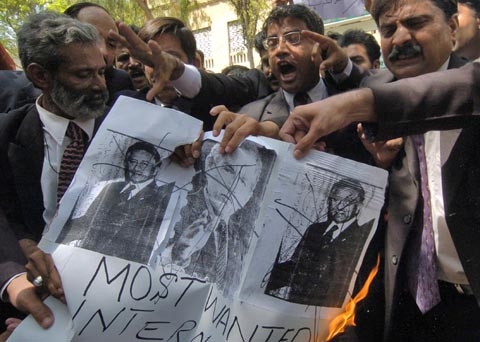 On the 9th March 2007, only nine days after US vice president Dick Cheney visited Pakistan, General Musharraf suspended the chief Justice of Pakistan, Iftikhar Chaudhury. When news spread across the country, lawyers, judges and the general people spontaneously protested at his dismissal over trumped up charges of ‘corruption’.
On the 9th March 2007, only nine days after US vice president Dick Cheney visited Pakistan, General Musharraf suspended the chief Justice of Pakistan, Iftikhar Chaudhury. When news spread across the country, lawyers, judges and the general people spontaneously protested at his dismissal over trumped up charges of ‘corruption’.
Why was the chief justice removed?
With the Pakistani elections scheduled for the end of the year, General Musharraf is desperate to stay in power. in order to do this he needs to postpone the elections and extend the tenure of the current assemblies and thus use their votes to prolong his term in office, a pliable supreme court is required to do this successfully.
This is where the problem lies. The chief justice was known for his ‘independence of mind’. Even when other institutions in Pakistan rubber stamped government decisions, he had taken opposing views on some crucial issues. The judge took a strong line against the extra judicial arrests made by General Musharraf’s secret services at the behest of the US. It was also reported that Iftikhar Chaudhry told trainee military officers in February that, in his opinion, General Musharraf could not continue as army chief beyond his present term as president. These incidents and others seemed to incense the dictator and he decided to remove the Judge as he was seen as an obstacle to his plans to stay in uniform and in power.
What was the reaction?
The response of the people and lawyers came as a great surprise to Musharraf. Demonstrations were brutally crushed by the security forces[1]. Even media channels which showed the demonstrations were taken off air for a short period.
On Friday 16th February another series of demonstrations occurred and were similarly crushed. Opposition leaders were arrested, even the former President, Rafique Tarar, was detained. Geo TV's news station was smashed up by the security forces. All this resulted in a great swathe of resentment against the government, where it was forced to apologise for the ‘misdeeds of a few zealous’ policemen.
What can we learn?
Musharraf’s manipulation of the judiciary is in a long line of ploys aimed at extending his rule. However, these tactics are not only confined to military governments, previous civilian rulers have also undermined and dismissed chief justices of the supreme court. What stands out most clearly is that the rhetoric about Western values which Musharraf continually espouses has no credibility and can be sacrificed at the alter of Western interests. Pakistan is a land where democratic elections are held after military coups, where freedom of the press results in its restriction and judicial independence is subject to dictatorial suppression. This is supported directly or covertly by Western institutions and powers. Indeed talk of change is limited, even in the Western media, to which General might replace Musharraf ‘now that he’s served his purpose’, and which politician can be annointed as Prime Minister to ensure a smooth pro-western succession.
The Muslims of Pakistan, both its masses and its intelligensia are now waking up to a political realisation that secular values are incapable of providing either economical progress or enlightenment. Values need to be permanent, independent and rugged, able to withstand criticism from analysts or onslaughts from opponents. The Khilafah is the system which provides representative rule, an independent judiciary and a constitution which provides stability. This is what the people of Pakistan are desperately seeking and indeed what they deserve. The official photo of Chief Justice Iftikhar Chaudhry is taken with a flag declaring the Quranic principle, “Rule over the people with Justice”. Is it not time that that Quranic flag triumph over secular rule that has brought injusctice in Pakistan for so long?
Our responsibility is not to see Pakistan fall into a vicious circle of civilian and military rule, where either way the nations assets are sold to modern ‘East India Companies’, where the US can establish military bases and the water supply is negotiated away.
What can we do here in the UK?
1. Show our anger at the events of the Pakistani government, by contacting its representatives in the UK
2. Contact the media, urdu and english, and give our views that it is unacceptable for the government to continue in its current way.
3. Show the contrast in the approach that the British government and media has had with the Zimbabwean regime, when they condemned the brutal treatment of its opposition yet have remained silent over the excesses of its ally General Musharraf.
4. Tell as many relatives in Pakistan that Muslims here see what is happening – that these are all part of efforts of the US – through its proxy ruler in the region – to prevent the rise of an independent Islamic state in the region that governs with the justice of Islam to look after the affairs of its citizens. The Khilafah will prevent the US from exploiting the region and it is the only hope to end the cycle of corrupt rule that has plagued the people for decades.
